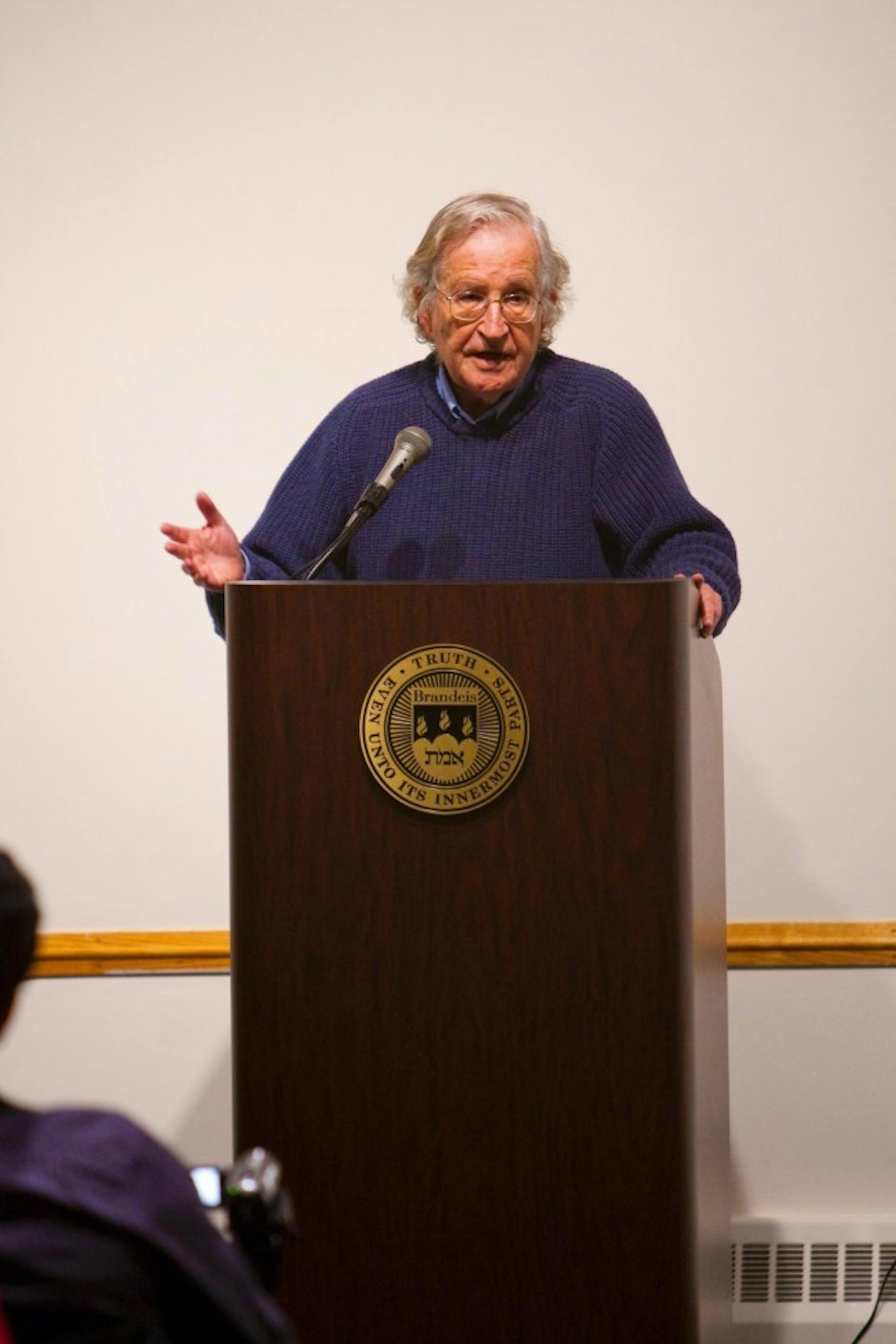Chomsky offers ideas
Noam Chomsky, professor emeritus of linguistics at the Massachusetts Institute of Technology and political activist, addressed students, faculty and alumni on the topic of the Israeli-Palestinian conflict last Thursday, focusing on conflict resolution and further insight into the Middle East struggle for peace.
Chomsky last appeared at Brandeis almost exactly a year ago on Nov. 11, 2010, when approximately 50 pro-Israel students stood up during his speech and left the room in protest.
Chomsky's presentation this year was the featured event of the Brandeis Palestine Awareness Week, a week co-sponsored by Students for Justice in Palestine and Jewish Voice for Peace.
Chomsky began by saying that the Israel-Palestine conflict is easy to solve and that a resolution has only been hindered by the United States and Israel.
Chomsky asserted that Egypt, Syria and Jordan had proposed a political settlement to the United Nations based on United Nations Resolution 242—a resolution following the end of the 1967 war that called for "secure and recognized boundaries" and for Israel to withdraw from territories it occupied in the war. It also called for "guarantees for the rights of states in the region to exist, in decent security with its secure recognized boundaries" and "a Palestinian state in the occupied territories," he said.
Chomsky said that the formulated land proposal had an "overwhelming international consensus that virtually no one formally disagrees with."
Referring to the consultations for the resolution, Chomsky claimed that "Israel refused to attend the session. Instead, they bombed Lebanon for no credible reason, killing 50 people," while the United States vetoed the resolution.
Chomsky spoke of the Arab Spring and the popular uprising this past January in Egypt.
Chomsky discussed both the United States and the Egyptian leaders' opposition to any type of "true democracy" in the Middle East. He also stressed the vast number of Egyptians who oppose U.S. policy in Egypt.
"Opposition to U.S. policy in Egypt was so strong that about 80 percent of the population thought the region would be more secure if Iran had nuclear weapons," he said.
Chomsky addressed the issue of secret prisons and compounds within Israel, specifically in regards to the story of Gilad Shalit, the Israeli Defence Forces soldier who was abducted by Palestinian commandos in June 2006 and only released recently in a prisoner exchange deal.
Chomsky said that the 1,000 Palestinians released in exchange for Shalit are "but a small fraction" of prisoners being held in secret prisons across Israel.
Closing with a question-and-answer session with audience members, Chomsky addressed several aspects of the conflict, including questions of Palestinian leadership.
When asked why the Palestinian authority has such low credibility in the eyes of Palestinians, Chomsky commented that because Hamas and the Palestine Liberation Organization have inner hostility and have failed to achieve a unity agreement after multiple attempts, they are viewed as hostile organizations.
He went on to say that if Palestinian officials receive Security Council permission for statehood, the U.S. could veto, which would hurt U.S. credibility due to the fact that the U.S. would be openly going against a UN-sanctioned attempt to present Palestine with statehood.
Chomsky elaborated on the U.S. interest in preserving the Israeli conflict, stating that in the eyes of American leaders, "Israelis are people, but Palestinians are ‘un-people.'"
Chomsky referred to Palestinians as "un-people" because he said they are seen in the eyes of the Israeli and U.S. governments as not worthy of equal protection.
In an interview with the Justice, Julia Beier, a master's student in Sustainable International Development, said, "I heard a lot about [Noam Chomsky], and I support his point of view."
Ramesh Yadawar, another master's student in Sustainable International Development, said that he "felt an affinity to the movement. I have been following the Israel-Palestine issue for many years, and the developments in Palestinian statehood have really been of great interest to me, because it has a lot to do with the movement and the struggles of people."
Yadawar went on to say that "I agreed with what Chomsky said, but I think he spoke a lot about violence and terrorism on the part of the U.S. and Israel and didn't really focus on the other side of the issue."



Please note All comments are eligible for publication in The Justice.